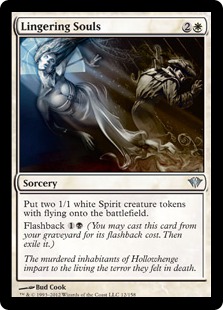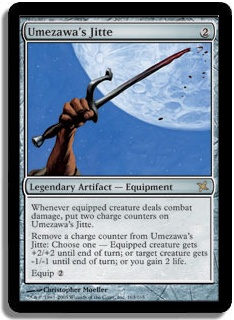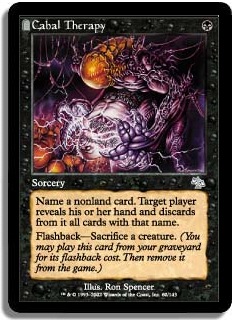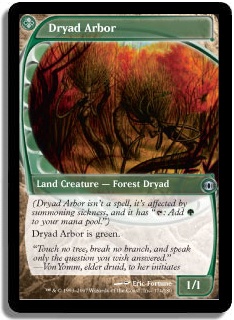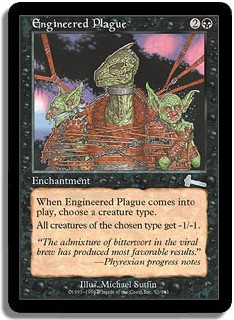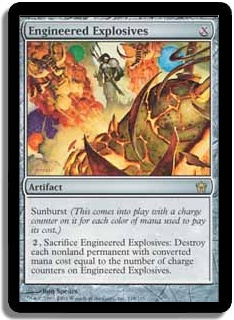I don’t have a lot of opportunities to play Legacy, as the local scene in Australia is largely based on ten- to twenty-person tournaments paying out store credit as prizes. I also don’t own a lot of Legacy cards on Magic Online, as many of them are prohibitively priced. And considering that this is where I do most of my testing, I often find it difficult to feel prepared when I do play. That being said, when I do play Legacy I always have a great time.
The format seems diverse but at the same time easy to analyze. There are the decks that go broken, and there are the decks that try to beat them. There are even decks that try to capitalize on those that aren’t going broken by simply beating them up in the mid game. Yes, these are gross generalizations, but I find it much easier to build decks if I can lump them all in together. At the moment, I think that Belcher is the best example of a deck that goes broken. Show and Tell seems to be the most prominent combo deck, with Storm having a healthy showing. Miracles, Stoneblade and RUG Delver are the decks that try to beat them, whereas Maverick and Goblins seem to be the decks that try to rule the mid game.
In the past couple of years, whenever I have played Legacy I have treated the format as having these three types of decks. I try to build something that I think can compete against all of them, and quite often I tend to combine decks that I like some aspect of. Last year I was playing Natural Order (NO) BUG. I liked the Team America Control decks, but I wanted something better than Tombstalker. Considering that NO RUG was a major player, I played Natural Order in BUG.
Creatures (6)
Lands (21)
Spells (33)
- 4 Brainstorm
- 4 Hymn to Tourach
- 4 Force of Will
- 4 Natural Order
- 4 Daze
- 1 Snuff Out
- 4 Thoughtseize
- 3 Preordain
- 4 Green Sun's Zenith
- 1 Go for the Throat
Sideboard

I didn’t always have enough black sources for Hymn to Tourach, enough green creatures for Natural Order, or enough blue spells to pitch to Force of Will, but I was playing some super powerful cards. Most of the time it worked out.
Recently, I have wanted to play Lingering Souls and Umezawa’s Jitte. Lingering Souls seems amazing against Jace, the Mind Sculptor and RUG Delver, and when combined with Jitte it just dominates. Esper Stoneblade seemed like the appropriate way to do it, but it didn’t really feel that powerful. After enviously watching my opponents tap their Sensei’s Divining Top mid-combat to play Terminus, I decided I would cook up a hybrid. This is what I ended up with:
Creatures (4)
Planeswalkers (3)
Lands (22)
Spells (31)

With this list in mind, I was keen to play in the recent MOCS. Unfortunately I didn’t have many of the cards, and a price search showed that I needed close to one thousand tickets. That wasn’t going to happen. I have one good friend who does own said cards, but he had already promised his Control deck to another friend. He generously offered me the use of the rest of his Legacy collection, and with that restriction in mind, it was once again time to mash a couple of decks together.
I still really wanted to play Souls and Jitte, but without Force of Will I thought I might look into Maverick. In short, I don’t like the Maverick deck. It seems like it is doing some powerful things consistently, but much of the deck is based around little support creatures and a "Hail Mary" in the form of Thalia, Guardian of Thraben. Thalia feels like your only hope against the unfair decks. However, I really did like Green Sun’s Zenithing for Dryad Arbor, Noble Hierarch, and Knight of the Reliquary. Knight might just be the best creature in the format, but other than that I wasn’t impressed. Still wanting to play Lingering Souls, I eventually came up with this list:
Creatures (14)
- 1 Birds of Paradise
- 4 Dark Confidant
- 3 Noble Hierarch
- 4 Knight of the Reliquary
- 1 Qasali Pridemage
- 1 Scavenging Ooze
Lands (25)
Spells (21)

I like a lot of things about this list. The Maverick shell adds a lot of early game consistency as well as late game power. Four mana dorks and four Green Sun’s Zeniths (for Dryad Arbor) allow you access to eight ways of acceleration on turn 1, while still being able to fetch Knight of the Reliquary later. Dark Confidant, Lingering Souls, and Umezawa’s Jitte are all excellent in the mid game and seem to fit the shell quite well. The black disruption actually gives the deck game against combo and lets you dictate the pace of play.
Cabal Therapy combines very well with Lingering Souls but also with Dryad Arbor as all of your eight fetchlands give you access to an expendable creature. All of the cards feel powerful and synergize well with one another. You either accelerate or disrupt them on turn 1 then land a series of powerful threats. The deck also feels consistent. If they have an excellent draw you are sometimes holding the wrong cards, but if they don’t you usually dominate them with the raw power that your threats provide.
The sideboard Enlightened Tutor package is something that I saw quite a while ago, and I was eager to try it out. I have liked it a lot. I usually want to side out some number of either removal or discard spells, which simply get replaced by the Tutors with their appropriate targets. Oblivion Ring is the key card against Show and Tell, but I also tend to side in one or two in a lot of matchups to give the Enlightened Tutor an additional target.
Choke is ideal against blue-based control decks. I also side it in against the blue-based combo decks as a way of restricting their mana access should the game go long. Engineered Plague is at its best against Elves and Goblins but is also good against Enchantress (naming Druid). Most Enchantress lists are running just Argothian Enchantresses, Green Sun’s Zeniths, and Enchantress’s Presence as opposed to the other assorted three-cost varieties. This means that with a Plague on Druids they will only have Enchantress’s Presence as their draw engine.
For the Storm matchup, Rule of Law is in there over Ethersworn Canonist, as Canonists can and often will be picked off by Pyroclasms and Massacres that are already good against you. The additional mana is significant but worth it I think. Nihil Spellbomb is the graveyard removal of choice over Wheel of Sun and Moon, as you’ll often want to side it in against non-Dredge graveyard-based decks. It is a way to interact with their Knights, Snapcaster Mages, and Academy Ruins while at the same time not losing value if they don’t draw them.
Engineered Explosives is a bit of a catchall. I quite like having access to these Tutorable catchall options as you never really know what they’ll be playing or what you may need to interact with, especially in a format like Legacy. Sylvan Library is obviously at its best against the slower decks and comes in quite a lot to give you an alternate Tutor target.
After a couple of days of tuning and testing, I was pretty happy with where the list was. It was still a teensy bit vulnerable to Terminus and sometimes you just drew the wrong pieces in the wrong matchups, but overall it felt pretty solid.
The MOCS was scheduled to start at 4 AM Sunday local time. This really wasn’t the most convenient of times, but Magic Online weekend events rarely are. I had already made plans to go out on Saturday night with some friends. I managed to manipulate my sleep patterns such that I’d wake up at 9 PM Saturday, go out on the town, and be home in time for the event. Fast forward four hours, and the MOCS was the last thing on my mind. I decided that I wouldn’t play and would just enjoy the night. Things started winding down after 4 AM, and I began to regret my choice.
I got home a few minutes before 5 AM and logged on. As is turns out, I had cunningly submitted a deck a couple of days earlier, just after I had borrowed the cards. Combined with my one bye, I was still in the event. By the time I realized this I was two minutes from timing out and in no state whatsoever to be battling through ten rounds of Magic. When my turn 1 Green Sun’s Zenith revealed that my deck didn’t contain a Dryad Arbor, I all but wrote off the event. I had pretty low expectations for this event in the first place, but after a couple of productive days of testing I really wanted to give it a shot.
I managed to win my first round (round two) despite no Dryad Arbor, but my confidence took another shot when I realized that my sideboard contained neither an Engineered Plague nor an Engineered Explosives. I won round 4, but in round 5 I was paired against Goblins. The games were close, but without Plague the matchup is really tough.
I won another couple of rounds, mostly against RUG Delver. This is an excellent matchup thanks to Lingering Souls and Knight of the Reliquary, and at 6-1 I was actually starting to feel positive. The lack of Dryad Arbor had come up quite a lot, but the power of my other cards was pushing me through. And then I was paired against U/G Enchantress. Without Plague and Explosives, my opponent was able to assemble multiple Enchantresses, giving me no chance.
I’m not sure how the match would have panned out if I would have had them. Without drawing them I would have still been thrashed, but I think even drawing just one would have made a huge difference. Another couple of wins and I was thinking about Top 16, but a last round loss to Omni-Tell left me with a disappointing 8-3 record.
Despite the event being a comedy of errors, the deck felt like it had promise. Justin Cheong, the gentleman from whom I borrowed the cards, was out of the country competing at the Magic World Cup. This meant that I had a few more days with the cards. I continued testing, and my attitude towards the deck didn’t change. I feel it possesses the appropriate disruption and threats for the current metagame. Maverick alone doesn’t feel powerful enough, but Lingering Souls and Dark Confidant seem criminally underplayed. I think Junk Soul Brother is an attempt to remedy this.
Knight of the Reliquary was even more absurd than I thought she would be. I have very little doubt that she has a long-term place in Legacy, and I find it amazing that Maverick is the only tier deck currently taking advantage of her. The ability to fetch sweet utility lands and effectively tap for mana all the while being the largest creature on the board feels like something that many decks would want access to.
I hope you have enjoyed reading about my Legacy deckbuilding process, and I urge you to give this deck a go. I look forward to your comments and suggestions.
Dan Unwin
Sledgesliver on Magic Online

